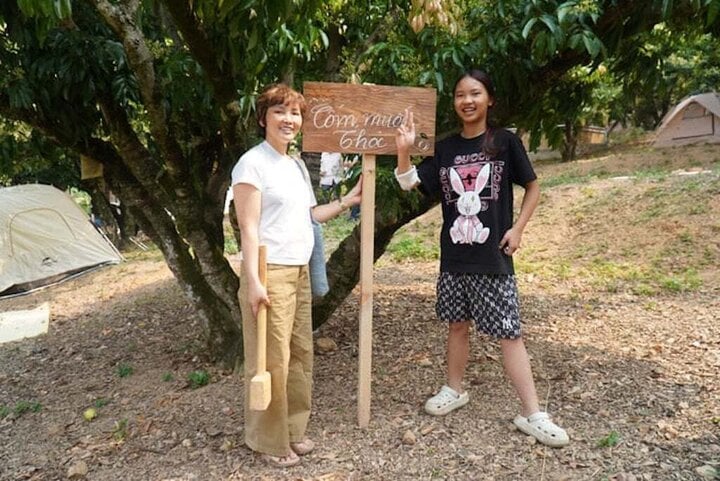
Growing fruit trees for tourism
According to Bui Duc Van, Chairman of Hong Giang commune (Luc Ngan district), from 2019 to the present, during each fruit harvest season, Ngot village welcomes thousands of tourists who come to visit and experience the local culture.
Customers buy whole fruit trees that are ready for harvest, such as lychee, longan, orange, or pomelo – whatever is in season. They then climb the trees themselves to pick and harvest the fruit, hand-picking the clean produce that has been cared for year-round by local farmers according to organic and VietGAP standards.
Besides the boxes overflowing with fresh, cool fruit to take back to the city, they also got to keep the photos – beautiful moments of the whole family's experience after a few days of vacation.
Ms. Nguyen Thi Hoa's family (Yen Hoa ward, Cau Giay district, Hanoi ) is one of the regular visitors to Luc Ngan lychee-growing region. In 2019, during a visit to Luc Ngan to see relatives in Ngot village (Hong Giang commune) during the lychee ripening season on the hillsides of the midland region, Ms. Hoa and her husband and three children participated in harvesting lychees with the locals, enjoying the sweet and refreshing taste of the first harvest right in the orchard – a new and exciting experience…
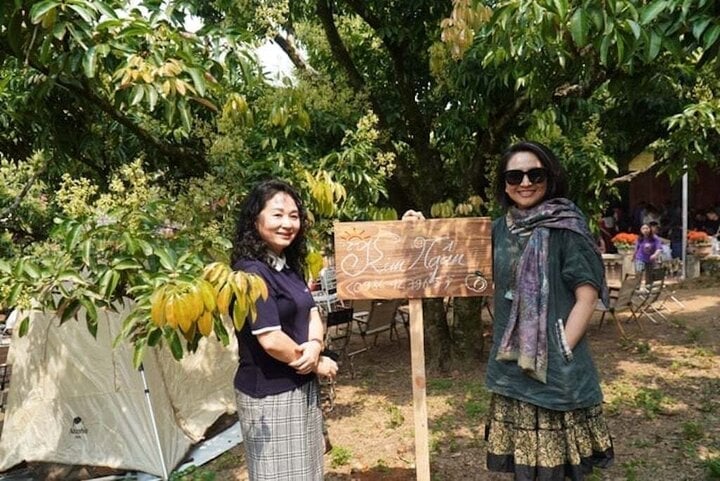
Tourists buy lychee trees in season so they can personally care for them and harvest the fruit.
“The family trip was very meaningful; the children received educational experiences. For the first time, they learned where the lychees their parents brought home from the city came from, how they were grown, and how hard the farmers worked to care for them. They even learned how to climb the trees, pick the fruit, and use a pole with a hook to twist the bunches of lychees high up – these were all very new life skills for city children.”
"After the trip, I noticed a big change in my children. They learned to appreciate the value of hard work, to appreciate the fruits of their labor, likening them to a fruit that requires so much effort and time to obtain," Ms. Hoa said.
After that trip, every year, she plans for the whole family to return to Luc Ngan, the land of lychees, to experience it, perhaps during the lychee season or the orange and pomelo harvest season… Not only is it a plan for her own family, but Ms. Hoa also encourages her friends to organize these meaningful and practical "labor tourism" trips that combine work and leisure.
Chairman Bui Duc Van was born and raised in Hong Giang commune. His family also owns 2 hectares of lychee orchards passed down from his ancestors. His family's lychee orchard is clean, well-maintained, and neatly arranged, and he is also directly involved in welcoming tourists to the Hong Giang lychee-growing region and the Luc Ngan fruit-growing region.
“The entire commune has 521 hectares of fruit trees. In 2021, even during the peak of the pandemic, the commune's lychee harvest reached 5,000 tons. The commune's revenue from lychees reached 100 billion VND per year. The commune has more than 2,000 households growing fruit trees, and currently more than 1,000 households have implemented a model of combining fruit tree cultivation with tourism,” the Chairman of Hong Giang commune proudly stated.
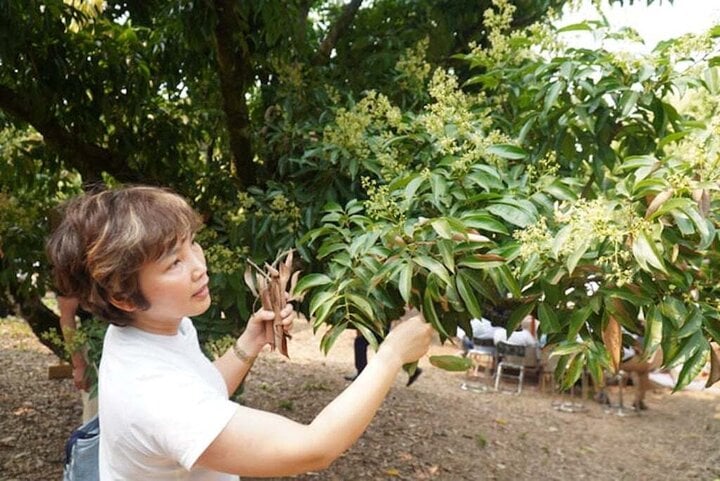
Customers personally care for the lychee tree they have chosen, owning it for a year until it bears fruit for the next season.
Ngọt Village is home to the largest area of citrus orchards in the commune. The village has 147 households, 100% of whom are ethnic minorities, primarily the San Chi people (a small branch of the Dao ethnic group).
Mr. Du Van Dung's 3-hectare lychee orchard, situated on a gently sloping, bowl-shaped hill, is nearly 40 years old and its canopy is beginning to close. He meticulously clears the weed-free paths that wind along the hillsides, winding beneath the ancient lychee trees. Before incorporating tourism into the area, these paths were used by locals to weed, spray pesticides, and harvest lychees each year. Now, they have taken on a new function – a tourist route for the farmers of Bac Giang.
Besides lychees, the orchards of oranges and pomelos laden with fruit in Luc Ngan are attracting tourists. Orchard tourism is truly bringing a fresh and exciting energy to these fruit gardens, which were previously quiet and deserted, only bustling during harvest seasons.
Farmers, who have toiled silently and diligently, are now engaging in new forms of competition. Besides focusing on ensuring their orchards bear abundant fruit, they are also cultivating and beautifying their gardens, creating vibrant flowers that attract butterflies and bees…
However, not every household that grows fruit trees can engage in tourism. To attract and retain visitors, the orchard must be clean, have distinctive features, provide a pleasant atmosphere, and even require comprehensive investment.
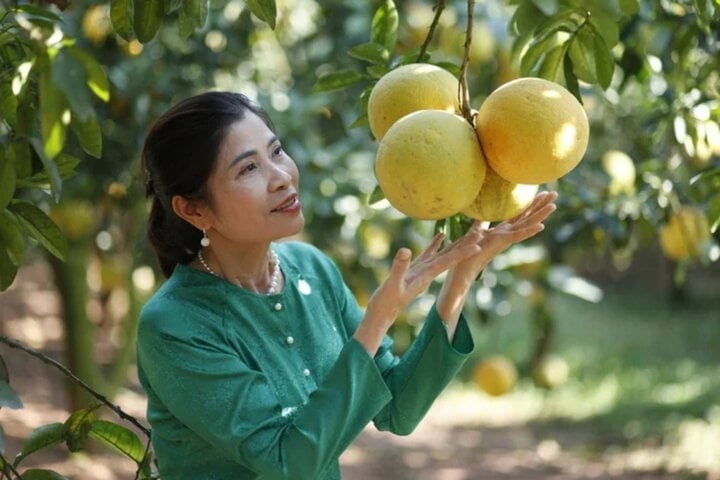
The orchards laden with fruit in Bac Giang are opening up new opportunities for the locality.
"As the old saying goes, a clean house is comfortable, and clean dishes make food taste better. To develop tourism, we must consciously tidy up and clean our gardens, plant trees organically, and avoid using harmful pesticides... Even the way we speak, our social understanding, and our communication skills must change; only then can we attract and retain guests," Mr. Van shared.
The commune chairman continued, "The 'orchard tourism' that the people of Hong Giang often call 'lychee orchard tourism' brings many benefits: visitors buy entire trees, and some regular customers even come to order whole trees at the beginning of the year when the lychee trees are in bloom. The orchard owners number the trees, put up signs, and when the lychee trees bear fruit or develop seasonal diseases, the orchard owners will notify the buyers so they can come and check and care for the trees together..."
The connection with people, nature, and society through the lychee tree has become even stronger. Most importantly, the farmers of Luc Nam have broadened their horizons and learned new experiences and skills beyond just tending the trees, weeding, and fertilizing…
The rise of the largest fruit-growing region in Northern Vietnam.
Luc Ngan is currently the largest fruit-growing area in Northern Vietnam. The entire district has a total of over 28,000 hectares of fruit trees, including many specialty varieties such as lychee, longan, and citrus fruits (sweet oranges, yellow-fleshed oranges, Dien pomelo, green-skinned pomelo, Hoang pomelo, etc.).
Luc Ngan boasts four seasons of fruits and flowers throughout the year, attracting tourists. With their beautiful appearance and high quality, Luc Ngan fruits have established a strong brand in the national market and are exported to demanding markets such as the EU, Japan, South Korea, and the United States.
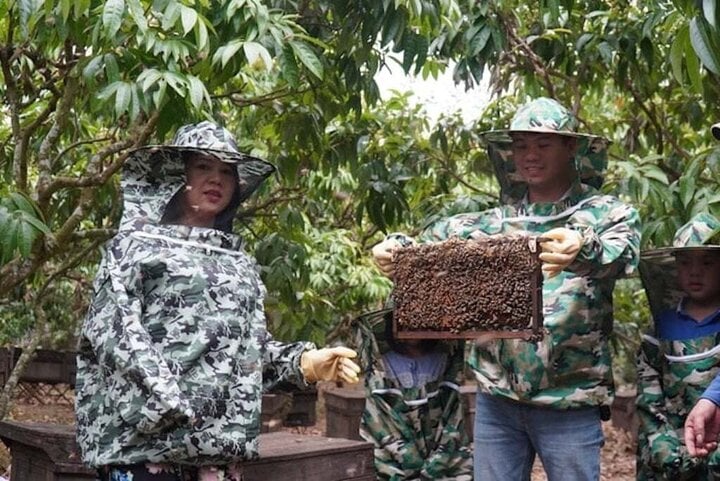
Experience harvesting honey from bees raised in a lychee orchard...
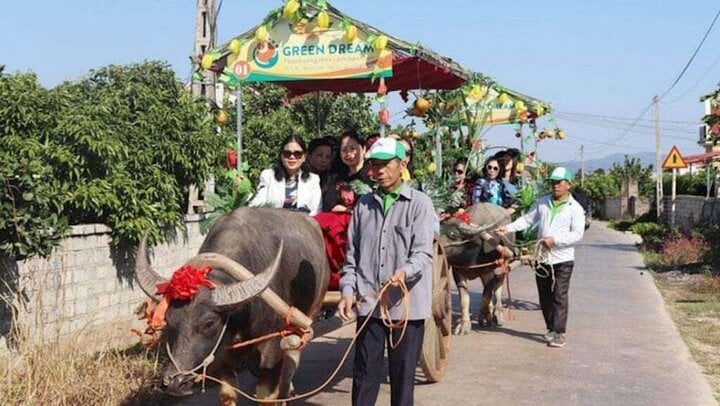
Or take a buffalo cart ride along the newly developed rural roads, admiring the lychee orchards of Luc Ngan stretching across the hills...
According to Nguyen Viet Oanh, Secretary of the Luc Ngan District Party Committee, the local orientation for developing garden tourism focuses on agriculture and rural areas. The New Rural Development program serves as a foundation to support the development of diverse tourism types with stable destination quality, while tourism development is also a solution to promote the development of the New Rural Development program.
In Luc Ngan, agricultural tourism activities began to develop on a small scale in small, spontaneous groups starting in 2019. At that time, groups of tourists contacted orchard owners themselves, and during the fruit harvest season, they could experience picking fruit themselves, enjoying fresh fruit in the orchards, riding ox carts to explore the lush fruit gardens, visiting orchards, beekeeping models, and Chu noodle production...
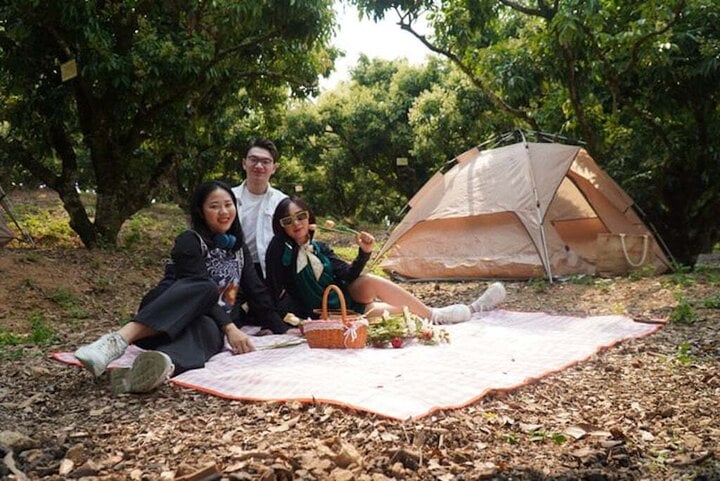
Tourism linked to agriculture and rural areas is a refreshing new trend blowing through Luc Ngan, the region known for its billion-dollar fruit crops.
To stimulate demand and build a tourism brand for approximately 60 orchards concentrated in the communes of Nam Duong, Hong Giang, Tan Son, Giap Son, Giap Quy, Thanh Hai, etc., Luc Ngan has intensified various activities to raise awareness among officials and the people.
The district has also developed Plan 159 on promoting tourism in Luc Ngan district for the period 2021-2025, which includes a focus on applying digitalization in tourism development.
Besides its orchards, Luc Ngan has ample potential for tourism development thanks to the indigenous cultural potential of its eight ethnic groups. Many of these minority groups still preserve rich, diverse, and unique traditional cultural features, such as the Tan Son highland markets, the Sloong Hao singing festival, the San Chi folk songs of Kien Lao commune, and the Cao Lan folk songs of Deo Gia commune, which have been recognized by the Ministry of Culture, Sports and Tourism as national intangible cultural heritage.
Furthermore, with its mild, cool climate, extensive forest cover, and numerous ecotourism resources such as Khuon Than Lake and Cam Son Lake, Luc Ngan is expected to become a center for garden tourism in the northern midland and mountainous region.
(Source: Vietnam Agriculture Newspaper)
Source








































![[Photo] A large number of people offer incense and visit the Ho Chi Minh Memorial Church.](https://vphoto.vietnam.vn/thumb/1200x675/vietnam/resource/IMAGE/2026/02/21/1771668099014_ndo_br_12-resize-7721-jpg.webp)


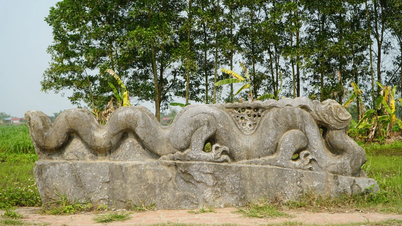



































































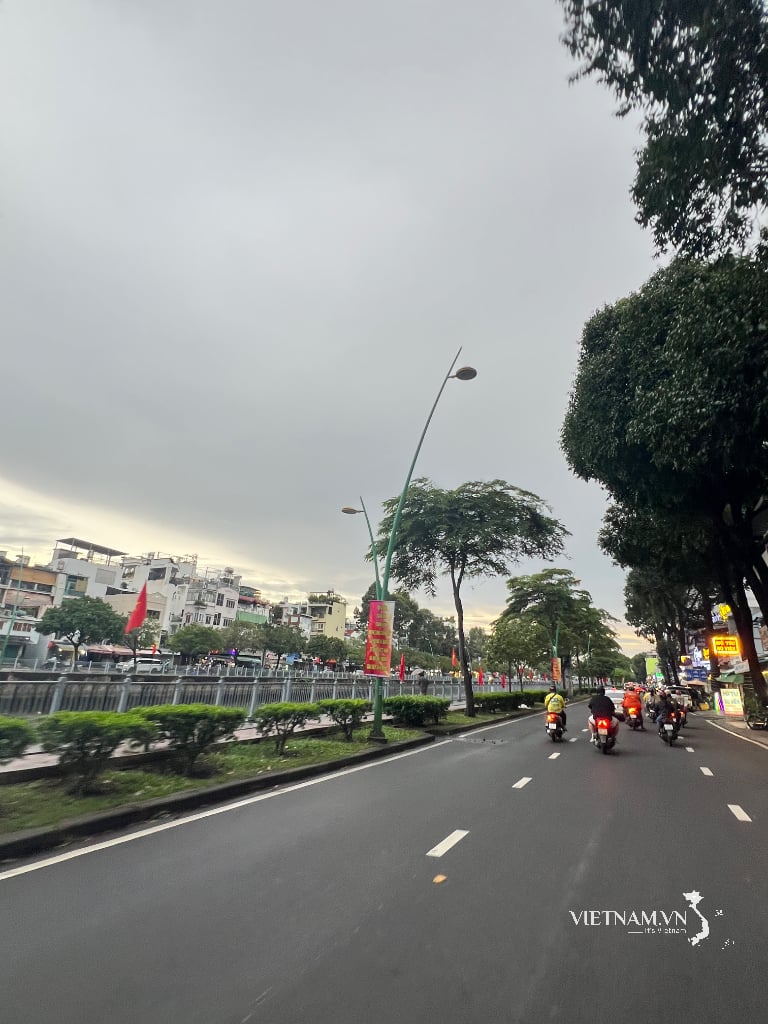

Comment (0)